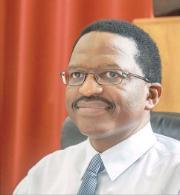
IF YOU'RE on the streets of Grahamstown at 4.30am, you might see the vice-chancellor out jogging. "It's a wonderful time of the day and it is one of the aspects of Grahamstown that makes living here so enjoyable. I can jog and enjoy the beauty of creation and the fresh air," said Dr Sizwe Mabizela.
Jogging energises him for the long day ahead. On most nights his office light burns deep into the night.
"Long hours don't bother me. I enjoy my work," he said.
"I find the university environment very stimulating and I cannot imagine myself anywhere else but in an institution of higher learning."
Mabizela is a professor of mathematics and has been at Rhodes for 16 years. He served as deputy vice-chancellor for academic and student affairs from 2008. He was head of the department of mathematics (pure and applied) from 2004 to 2008.
He has been the acting vicechancellor since the departure of Dr Saleem Badat in July. After eight years at Rhodes, Badat resigned to take up a post in New York with the Andrew W Mellon Foundation's Higher Education Programme.
In South Africa, where mathematics is emphasised as a key study area for future graduates, Rhodes now has a mathematical maestro at its helm.
"I love mathematics, and have done so since childhood," said Mabizela, who has a PhD in parametric approximation from Pennsylvania State University in the US.
"The beauty of mathematics is that it inculcates in one ways of thinking systematically and innovatively about the widest range of challenges."
The biggest problem we face in South Africa, he believes, is that "we live in a globalised world in which there is a hegemonic dominance of the neoliberal free market logic, which makes the market the main thing. This breeds a society where people are preoccupied with the accumulation of personal wealth above all else."
As the new vice-chancellor he aims to lead by example in producing graduates who are not preoccupied with material gain.
"I have never had dreams of vast financial wealth... What is important is to gain knowledge that can help us understand our natural environment, human interactions and our place in the universe. It is all about developing a deeper understanding and appreciation of how we can live in this world in a sustainable manner, and in a manner that fosters social cohesion. And if, along this path, our graduates acquire significant material wealth, then my hope is that they will use it to make a change in the lives of those who are less fortunate in material and educational terms."
Mabizela grew up in Ladysmith, KwaZulu-Natal, and matriculated in 1980 from St Chad's High School there. His mother, Sibongile Mabizeia, was a nurse and his late father, Christopher, a teacher.
"They were very loving parents who instilled in us the importance and value of education. My father constantly reminded us that he didn't have any material possessions to bequeath us but what he could do for us was to make sure we received a quality education.
"My mother was a wonderful role model and she had a big influence on my interest in mathematics as she was very good at it. I was fascinated by it, and it came naturally to me. I was also very fortunate to have excellent mathematics teachers all the way from primary school through secondary school who developed my love of mathematics and gave me challenging problems, over and above the standard homework, to keep me interested."
This led to him enrolling for a BSc at the University of Fort Hare in 1981.
"Those were highly turbulent political times. The government had granted nominal independence to Ciskei, which included Fort Hare and as students we were involved in the resistance movement against apartheid and its homeland policies.
"We fought pitched battles with the police, the university was closed down on several occasions, and along with several of my peers I was arrested in 1983 because of my role in student protests and in the mobilisation of the United Democratic Front against the government."
Mabizela completed his honours and masters degrees in mathematics at Fort Hare, and earned a scholarship in 1986 to do his PhD in the US.
"It was a wonderful era in certain ways because the level of political consciousness was very high and most of us were united in the common cause of liberating the country from apartheid."
Thirty years later, he said: 'As a nation we have lost our way, we have lost our moral compass, which is a great tragedy. Unbelievable levels of corruption, consumerism and materialism have engulfed the ideals that we held so dear, and the vision we had for this country.
"We could never have imagined that so many of those who were at the forefront of the liberation struggle would be the first ones to be so seduced by material possessions. It is a terrible disappointment.
The role of universities in creating such a society, he said, is to produce graduates who are thoughtful, critical and engaged citizens.
"These are citizens who would want to be agents of social change and societal transformation, who would use their education and positions of power and influence to advance the cause of those who are less fortunate."
Article by: Heather Dugmore
Article source: Sunday Weekend Argus
MATHS MAESTRO: Dr Sizwe Mabizela is the new vice-chancellor of Rhodes University. PICTURE: MIKE DEXTER
